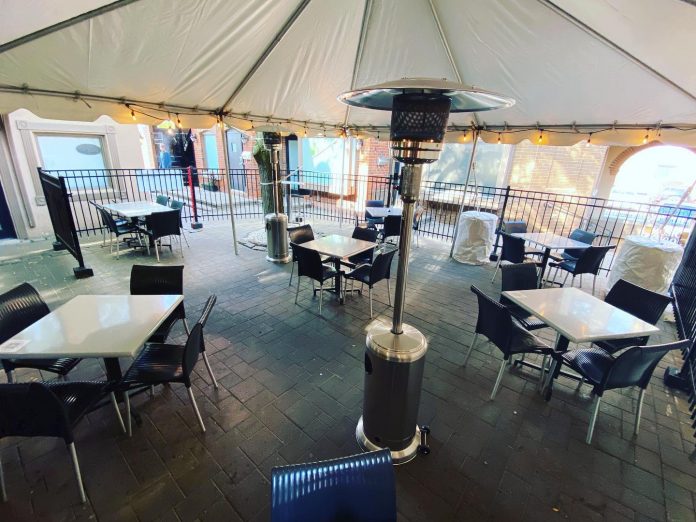As Ontarians attempt to take the chill out of outdoor gatherings in crisper weather, national and provincial safety partners encourage homeowners to learn the fundamentals of patio heater safety and maintenance.
With risks of carbon monoxide (CO) poisoning and fire a significant concern this season due to the potential for improper use of outdoor heating equipment, the Technical Standards and Safety Authority (TSSA), in partnership with Ontario Association of Fire Chiefs (OAFC), Ontario Municipal Fire Prevention Officers Association (OMFPOA), and Canadian Propane Association, offer the following fall and winter weather patio heater safety tips.
Patio Heater Selection
- Ensure all outdoor heating equipment is certified by the CSA, ULC or another recognized certification body.
Device Placement and Transport
- Patio heaters are designed for outdoor use only. To avoid carbon monoxide poisoning, never use patio heaters indoors or within an enclosed structure. Requirements for patio heaters in shelters are outlined in TSSA’s Patio Heater Safety Guidelines.
- Ensure outdoor heaters are positioned on a stable surface so they won’t get knocked over. Don’t install heaters on grass, uneven sidewalks, or near the edge of an elevated platform.
- Adhere to the manufacturer’s instructions for required clearances from combustible materials, such as umbrellas, awnings, walls, tablecloths, paper products and decorations.
- Keep fire extinguishers easily accessible.
- Never move a portable heater while the flame is lit. Make sure the fuel supply is properly shut off and the unit is cool before relocating.
Propane Cylinder Handling
- Ensure anyone operating a patio heater understands how to disconnect and install propane cylinders, including how to check for leaks. See TSSA’s Patio Heater Safety Guidelines for instructions.
- Propane cylinders must be stored upright, outdoors and in an area protected against tampering, unauthorized movement, dropping, or vehicle impact that could result in a leak or a fire. Never store propane cylinders indoors, in a garage, close to operational heaters, or near smoking areas.
- Use care when transporting propane cylinders. Up to five 20-pound propane cylinders may be transported in a vehicle provided they are safely secured in an upright position in the passenger compartment with the windows open, secured in a trunk with the trunk lid propped open for ventilation, or secured in the ventilated box of a truck. Transportation of more than five 20-pound propane cylinders must be conducted according to Transport Canada Transportation of Dangerous Goods regulations.
Keeping a Watchful Eye
- Never leave patio heaters unattended.
- Pay particular attention when children or intoxicated adults are in the vicinity.
- Teach family members and guests to recognize the symptoms of carbon monoxide poisoning, which include nausea, dizziness and headache.
Additional information for the safe use of patio heaters on residential or commercial patios can be found in TSSA’s TSSA’s Patio Heater Safety Guidelines and TSSA’s Patio Heater Safety Checklist for Restaurant Owners and Operators available at www.tssa.org.
Quotes
“The risk of CO poisoning isn’t limited to indoor areas. CO is produced by devices that burn fuel, like patio heaters, and deadly CO gas can accumulate in any environment with limited air movement. That’s why it’s so important to ensure that areas where patio heaters are located are well ventilated and verify that smoke and CO alarms located inside nearby shelters and buildings are working properly.”
Sam Sadeghi, Director, Fuels Safety, Technical Standards and Safety Authority
“As the weather cools and people look to keep warm while spending time outside, it is imperative that you remember the inherent risks with heating devices. All heating appliances or devices can spark a fire, even when used outdoors. Fuel burning appliances also produce carbon monoxide, which is dangerous if not properly ventilated. Be sure to only use fuel burning appliances in well ventilated areas. It is the responsibility of owners and operators of these devices to ensure that they’re properly installed, maintained, and ventilated according to the manufacturer’s instructions.”
Fire Chief Mark MacDonald, President, Ontario Association of Fire Chiefs
“Outdoor heating devices are great tools that provide temporary warmth when used according to the manufacturer’s instructions. Improperly used devices can lead to the risk of fire and carbon monoxide poisoning. When using these devices, ensure that they are kept away from combustible materials and used in well ventilated areas.”
Vince Giovannini, President, Ontario Municipal Fire Prevention Officers Association
“As we enter the cold weather season, many Canadians want to continue using outdoor spaces. Propane patio heaters are a safe, low-emission and effective way to heat any space. For portable propane heaters, always follow the manufacturer’s instructions to ensure safe set up and use outdoors.” said Robert Loenhart, Sr. Vice-President of Regulatory Affairs and Safety, Canadian Propane Association








